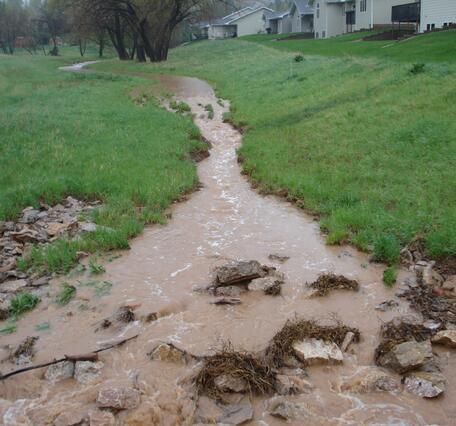
By: Alex Kaplan, Esq.
It is a situation that occurs frequently in hilly Western Pennsylvania: your neighbors’ home is located on a hill above your home, and they decide to perform construction on their property, such as installing a driveway. Now, whenever it rains you experience water seeping into your basement, garage, or another area of your home. If you find yourself in this situation, you are likely wondering what legal remedies are available to you under Pennsylvania law.
Generally, in Pennsylvania, an owner of higher land cannot be held liable for damage to the owner of lower land caused by water “which naturally flows from the one level to the other.” Kowalski v. TOA PA V, L.P., 206 A.3d 1148, 1160 (Pa. Super. 2019). However, an upper landowner is liable for the effects of surface water running off of his or her property in two distinct circumstances:
(1) “where the landowner has diverted the water from its natural channel by artificial means; or
(2) where the landowner has unreasonably or unnecessarily increased the quantity or changed the quality of water discharged upon his neighbor.”
Id. at 1162.
 In other words, an upper landowner is liable to a lower landowner for the effects of surface water running off of his or her property if the upper landowner alters the natural flow of water on his or her property through an artificial medium, or has changed the quantity or quality of water in an unreasonable or unnecessary fashion. Id.
In other words, an upper landowner is liable to a lower landowner for the effects of surface water running off of his or her property if the upper landowner alters the natural flow of water on his or her property through an artificial medium, or has changed the quantity or quality of water in an unreasonable or unnecessary fashion. Id.
Under the first theory of liability, whether a given use of land is considered “natural” or “artificial” depends in part on whether the land is in an urban or rural setting. In an urban environment, “orderly development of land … has always been regarded as a natural use of land.” LaForm v. Bethlehem Twp., 499 A.2d 1373, 1381 (Pa. Super. 1985). In contrast, development of rural land—such as the erection of buildings and installation of pavement—constitutes an artificial use of land. Kowalski, 206 A.3d at 1162. As such, developers must “make the proper accommodation so as not to place the burden of the increased flow upon the servient tenement.” Id.
If you live in a rural area in Pennsylvania and are experiencing increased surface runoff because your upper landowner neighbor has developed their property, you may contact our office for a legal consultation.
For more information about water runoff issues or other legal matters, contact the attorneys at Anderson & Labovitz, LLC at (412) 209-3200. Or you can email Alex Kaplan at akaplan@PaLawFirm.com. For more information about our firm, visit our website at www.PaLawFirm.com.


